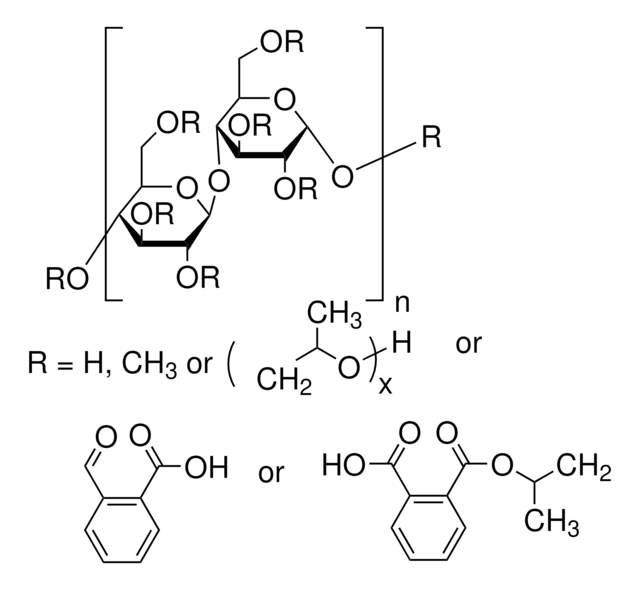H9262
(Hydroxypropyl)methyl cellulose
viscosity 80-120 cP, 2 % in H2O(20 °C)(lit.)
Sinónimos:
2-Hydroxypropyl methyl cellulose ether
Iniciar sesiónpara Ver la Fijación de precios por contrato y de la organización
About This Item
Productos recomendados
¿Está buscando productos similares? Visita Guía de comparación de productos
Application
(Hydroxypropyl)methyl cellulose acts as a thickener for aqueous and non-aqueous systems, is a water retention aid and steric stabilizer, and clear films with grease resistance. (Hydroxypropyl)methyl cellulose has been used to study mucoadhesion in the design of drug delivery systems to prolong intestinal residence time and has also been used to study the enhancement of dissolution rate of poorly water soluble drugs.
Thickener for aqueous and non-aqueous systems, clear films with grease resistance, binders, lubricants, steric stabilizer and water retention aid.
Features and Benefits
Dissolves in water, undergoes reversible gelation upon heating, non-ionic, does not complex with ionic species and is surface active and enzyme resistant. Solutions are pseudoplastic.
Other Notes
To gain a comprehensive understanding of our extensive range of Polysaccharides for your research, we encourage you to visit our Carbohydrates Category page.
Storage Class
11 - Combustible Solids
wgk_germany
WGK 1
flash_point_f
Not applicable
flash_point_c
Not applicable
ppe
Eyeshields, Gloves, type N95 (US)
Certificados de análisis (COA)
Busque Certificados de análisis (COA) introduciendo el número de lote del producto. Los números de lote se encuentran en la etiqueta del producto después de las palabras «Lot» o «Batch»
¿Ya tiene este producto?
Encuentre la documentación para los productos que ha comprado recientemente en la Biblioteca de documentos.
Los clientes también vieron
Deirdre M D'Arcy et al.
AAPS PharmSciTech, 20(2), 47-47 (2019-01-09)
Viscosity, influenced by medium composition, will affect the hydrodynamics of a dissolution system. Dissolution simulation methods are valuable tools to explore mechanistic dissolution effects, with an understanding of limitations of any simulation method essential to its appropriate use. The aims
Lucas Sievens-Figueroa et al.
International journal of pharmaceutics, 423(2), 496-508 (2011-12-20)
The design and feasibility of a simple process of incorporating stable nanoparticles into edible polymer films is demonstrated with the goal of enhancing the dissolution rate of poorly water soluble drugs. Nanosuspensions produced from wet stirred media milling (WSMM) were
Fernando Andrés et al.
Proceedings of the National Academy of Sciences of the United States of America, 111(26), E2760-E2769 (2014-07-01)
In Arabidopsis thaliana environmental and endogenous cues promote flowering by activating expression of a small number of integrator genes. The MADS box transcription factor SHORT VEGETATIVE PHASE (SVP) is a critical inhibitor of flowering that directly represses transcription of these
Jeonghoon Han et al.
Aquatic toxicology (Amsterdam, Netherlands), 152, 308-317 (2014-05-13)
In this study, we investigated the effects of the water-accommodated fraction (WAF) of crude oil on the development and reproduction of the intertidal copepod Tigriopus japonicus through life-cycle experiments. Furthermore, we investigated the mechanisms underlying the toxic effects of WAF
Jane W Agger et al.
Proceedings of the National Academy of Sciences of the United States of America, 111(17), 6287-6292 (2014-04-16)
The recently discovered lytic polysaccharide monooxygenases (LPMOs) are known to carry out oxidative cleavage of glycoside bonds in chitin and cellulose, thus boosting the activity of well-known hydrolytic depolymerizing enzymes. Because biomass-degrading microorganisms tend to produce a plethora of LPMOs
Nuestro equipo de científicos tiene experiencia en todas las áreas de investigación: Ciencias de la vida, Ciencia de los materiales, Síntesis química, Cromatografía, Analítica y muchas otras.
Póngase en contacto con el Servicio técnico




